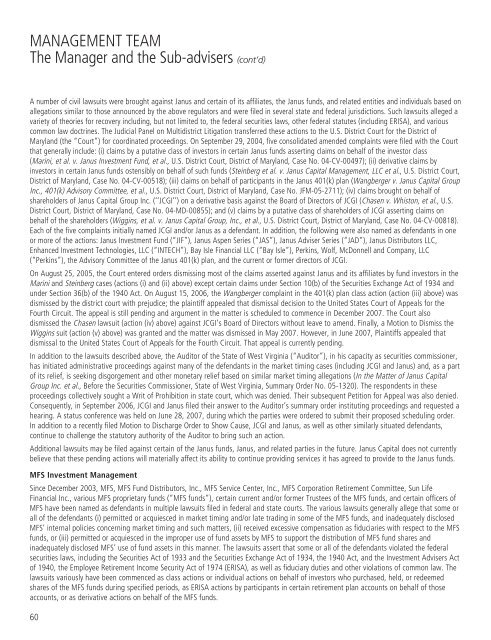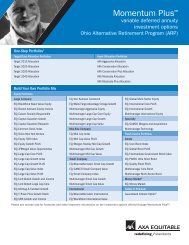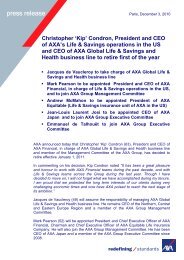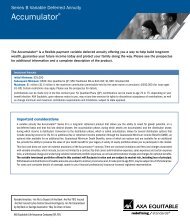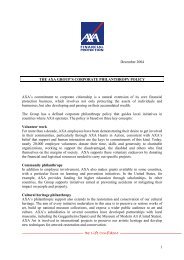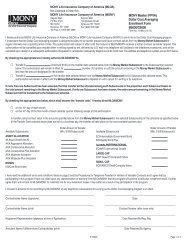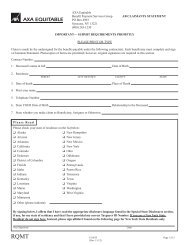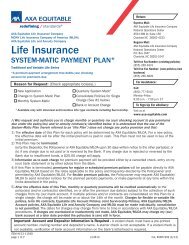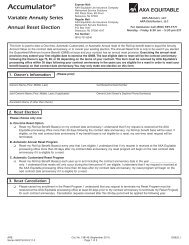EQUI-VEST - AXA Equitable
EQUI-VEST - AXA Equitable
EQUI-VEST - AXA Equitable
Create successful ePaper yourself
Turn your PDF publications into a flip-book with our unique Google optimized e-Paper software.
MANAGEMENT TEAM<br />
The Manager and the Sub-advisers (cont’d)<br />
A number of civil lawsuits were brought against Janus and certain of its affiliates, the Janus funds, and related entities and individuals based on<br />
allegations similar to those announced by the above regulators and were filed in several state and federal jurisdictions. Such lawsuits alleged a<br />
variety of theories for recovery including, but not limited to, the federal securities laws, other federal statutes (including ERISA), and various<br />
common law doctrines. The Judicial Panel on Multidistrict Litigation transferred these actions to the U.S. District Court for the District of<br />
Maryland (the “Court”) for coordinated proceedings. On September 29, 2004, five consolidated amended complaints were filed with the Court<br />
that generally include: (i) claims by a putative class of investors in certain Janus funds asserting claims on behalf of the investor class<br />
(Marini, et al. v. Janus Investment Fund, et al., U.S. District Court, District of Maryland, Case No. 04-CV-00497); (ii) derivative claims by<br />
investors in certain Janus funds ostensibly on behalf of such funds (Steinberg et al. v. Janus Capital Management, LLC et al., U.S. District Court,<br />
District of Maryland, Case No. 04-CV-00518); (iii) claims on behalf of participants in the Janus 401(k) plan (Wangberger v. Janus Capital Group<br />
Inc., 401(k) Advisory Committee, et al., U.S. District Court, District of Maryland, Case No. JFM-05-2711); (iv) claims brought on behalf of<br />
shareholders of Janus Capital Group Inc. (‘‘JCGI’’) on a derivative basis against the Board of Directors of JCGI (Chasen v. Whiston, et al., U.S.<br />
District Court, District of Maryland, Case No. 04-MD-00855); and (v) claims by a putative class of shareholders of JCGI asserting claims on<br />
behalf of the shareholders (Wiggins, et al. v. Janus Capital Group, Inc., et al., U.S. District Court, District of Maryland, Case No. 04-CV-00818).<br />
Each of the five complaints initially named JCGI and/or Janus as a defendant. In addition, the following were also named as defendants in one<br />
or more of the actions: Janus Investment Fund (“JIF”), Janus Aspen Series (“JAS”), Janus Adviser Series (“JAD”), Janus Distributors LLC,<br />
Enhanced Investment Technologies, LLC (“INTECH”), Bay Isle Financial LLC (“Bay Isle”), Perkins, Wolf, McDonnell and Company, LLC<br />
(“Perkins”), the Advisory Committee of the Janus 401(k) plan, and the current or former directors of JCGI.<br />
On August 25, 2005, the Court entered orders dismissing most of the claims asserted against Janus and its affiliates by fund investors in the<br />
Marini and Steinberg cases (actions (i) and (ii) above) except certain claims under Section 10(b) of the Securities Exchange Act of 1934 and<br />
under Section 36(b) of the 1940 Act. On August 15, 2006, the Wangberger complaint in the 401(k) plan class action (action (iii) above) was<br />
dismissed by the district court with prejudice; the plaintiff appealed that dismissal decision to the United States Court of Appeals for the<br />
Fourth Circuit. The appeal is still pending and argument in the matter is scheduled to commence in December 2007. The Court also<br />
dismissed the Chasen lawsuit (action (iv) above) against JCGI’s Board of Directors without leave to amend. Finally, a Motion to Dismiss the<br />
Wiggins suit (action (v) above) was granted and the matter was dismissed in May 2007. However, in June 2007, Plaintiffs appealed that<br />
dismissal to the United States Court of Appeals for the Fourth Circuit. That appeal is currently pending.<br />
In addition to the lawsuits described above, the Auditor of the State of West Virginia (“Auditor”), in his capacity as securities commissioner,<br />
has initiated administrative proceedings against many of the defendants in the market timing cases (including JCGI and Janus) and, as a part<br />
of its relief, is seeking disgorgement and other monetary relief based on similar market timing allegations (In the Matter of Janus Capital<br />
Group Inc. et al., Before the Securities Commissioner, State of West Virginia, Summary Order No. 05-1320). The respondents in these<br />
proceedings collectively sought a Writ of Prohibition in state court, which was denied. Their subsequent Petition for Appeal was also denied.<br />
Consequently, in September 2006, JCGI and Janus filed their answer to the Auditor’s summary order instituting proceedings and requested a<br />
hearing. A status conference was held on June 28, 2007, during which the parties were ordered to submit their proposed scheduling order.<br />
In addition to a recently filed Motion to Discharge Order to Show Cause, JCGI and Janus, as well as other similarly situated defendants,<br />
continue to challenge the statutory authority of the Auditor to bring such an action.<br />
Additional lawsuits may be filed against certain of the Janus funds, Janus, and related parties in the future. Janus Capital does not currently<br />
believe that these pending actions will materially affect its ability to continue providing services it has agreed to provide to the Janus funds.<br />
MFS Investment Management<br />
Since December 2003, MFS, MFS Fund Distributors, Inc., MFS Service Center, Inc., MFS Corporation Retirement Committee, Sun Life<br />
Financial Inc., various MFS proprietary funds (“MFS funds”), certain current and/or former Trustees of the MFS funds, and certain officers of<br />
MFS have been named as defendants in multiple lawsuits filed in federal and state courts. The various lawsuits generally allege that some or<br />
all of the defendants (i) permitted or acquiesced in market timing and/or late trading in some of the MFS funds, and inadequately disclosed<br />
MFS’ internal policies concerning market timing and such matters, (ii) received excessive compensation as fiduciaries with respect to the MFS<br />
funds, or (iii) permitted or acquiesced in the improper use of fund assets by MFS to support the distribution of MFS fund shares and<br />
inadequately disclosed MFS’ use of fund assets in this manner. The lawsuits assert that some or all of the defendants violated the federal<br />
securities laws, including the Securities Act of 1933 and the Securities Exchange Act of 1934, the 1940 Act, and the Investment Advisers Act<br />
of 1940, the Employee Retirement Income Security Act of 1974 (ERISA), as well as fiduciary duties and other violations of common law. The<br />
lawsuits variously have been commenced as class actions or individual actions on behalf of investors who purchased, held, or redeemed<br />
shares of the MFS funds during specified periods, as ERISA actions by participants in certain retirement plan accounts on behalf of those<br />
accounts, or as derivative actions on behalf of the MFS funds.<br />
60


